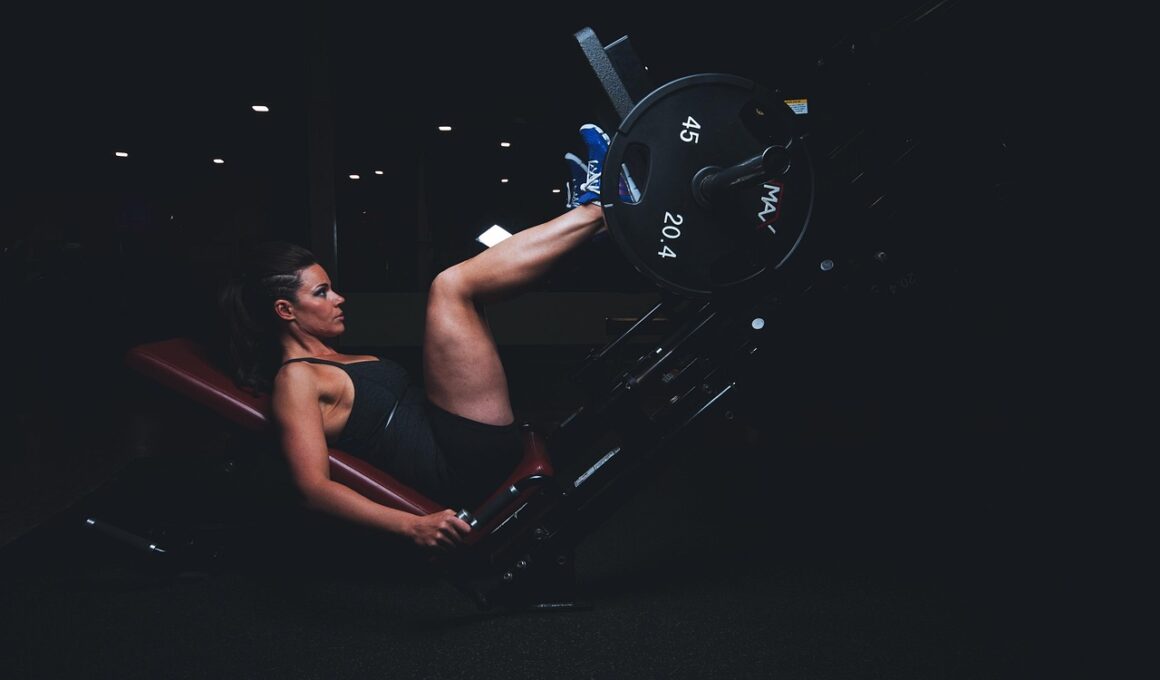Electrolyte Supplements: Do You Really Need Them?
Electrolyte supplements have gained immense popularity among athletes and fitness enthusiasts. After intense exercise, the body may experience a drop in electrolytes due to sweat loss. Electrolytes such as sodium, potassium, and magnesium are crucial for muscle function and hydration. The need for electrolyte replacement arises particularly after long-duration activities or those performed in hot conditions. Over time, inadequate electrolyte levels can result in dehydration, cramping, and fatigue. Many athletes swear by electrolyte supplements, claiming they enhance recovery and performance. However, the requirement for supplementation largely depends on individual circumstances, including the intensity of your workout and personal body chemistry. For those exercising lightly or moderately, water may suffice in replenishing electrolytes. Ultimately, understanding your needs is key. Monitoring factors such as workout duration, heat, and personal well-being can help identify if supplementation is necessary. One approach is to listen to your body and consider professional advice from nutritionists or trainers to determine the best course of action. This ensures you not only stay hydrated but also maintain optimal performance while keeping electrolyte balance in mind.
Electrolyte loss during exercise can be substantial, especially for those engaging in vigorous activity. During prolonged physical exertion, the body sweats to cool itself down, leading to a depletion of essential minerals. Sodium is the most abundant electrolyte in sweat, followed closely by potassium. When these minerals are lost, athletes might feel sluggish or even dizzy. It’s vital to replace lost electrolytes swiftly to restore balance. Many sports drinks on the market claim to replenish electrolytes effectively. However, they often contain added sugars and artificial flavors. For those looking for healthier options, natural alternatives like coconut water can provide essential minerals without unnecessary additives. It’s important to carefully evaluate product labels and ingredient lists to ensure you are choosing the right supplement for your needs. Additionally, real food sources such as bananas and avocados are excellent for replenishing potassium. By adopting a whole-food approach, athletes can receive a balanced intake of electrolytes suited to their individual diets and preferences. Before relying solely on supplements, one should assess overall daily fluid intake and dietary practices to ensure appropriate nutrition.
Benefits of Electrolyte Supplements
There are several benefits associated with electrolyte supplements, primarily their role in hydration and supporting athletic performance. When athletes engage in high-intensity workouts or endurance sports, maintaining electrolyte balance can be a game-changer. These supplements can help prevent cramps, muscle fatigue, and dizziness, contributing to a more effective workout session. When the body is well-hydrated and balanced with electrolytes, athletes often experience improved energy levels. Another advantage is the ease of consumption, as many supplements come in powder or tablet form, making them convenient. However, understanding when to use electrolytes is crucial. For instance, a simple 30-minute jog might not warrant an electrolyte drink, while a marathon certainly would. Personalized hydration strategies based on workout intensity and body composition are vital for success. Furthermore, research has shown that proper electrolyte replenishment can aid in quicker recovery after strenuous activity, propelled by a balanced intake of nutrients. Evaluating the timing and type of electrolytes consumed can maximize the benefits while ensuring the body remains in peak condition during training sessions.
On the other hand, some experts argue that electrolyte supplementation may not be necessary for everyone. Healthy individuals with balanced diets often receive enough electrolytes from everyday foods. Foods rich in calcium include dairy products, while fruits and vegetables provide ample potassium. It’s essential to conduct a thorough assessment of individual dietary habits to determine if supplementation is needed. By keeping track of diet and hydration, many may find they fulfill their electrolyte needs naturally. Moreover, staying hydrated with plain water can often suffice for less intense exercise. It’s critical to consider various factors, including age, gender, and activity level when evaluating the necessity for supplements. Young athletes, particularly, may have different requirements than older adults. Overall, it is best to approach supplementation cautiously, ensuring it complements a balanced diet rather than replacing it. Consulting a healthcare provider can also help clarify individual needs. By making informed choices, individuals can enhance their performance without relying solely on supplements for hydration and nutrient replacement.
Choosing the Right Electrolyte Supplement
When it comes to choosing an electrolyte supplement, quality is paramount. With the abundance of products available on the market, it’s easy to become overwhelmed. Checking labels for accurate information on ingredient composition can aid in making informed decisions. Seek formulations with appropriate ratios of sodium, potassium, and other critical electrolytes. Avoid products laden with excessive sugars or artificial sweeteners that could hinder performance rather than enhance it. A well-balanced product should contain essential minerals needed for replenishment without unnecessary additives. Additionally, flavors and types of supplements vary widely, catering to different preferences. For sports enthusiasts who prefer a refreshing drink, there are powder options; those who favor convenience might choose tablets or capsules. It is essential to consider dietary preferences as well; for example, vegetarians or vegans will want to select products that align with their lifestyle. Reading customer reviews and consulting with professionals in the field can also provide insight into popular choices. Ultimately, the goal is to ensure that any chosen supplement effectively supports individual hydration and performance needs, setting the foundation for success in any fitness journey.
The timing of electrolyte consumption can significantly influence effectiveness. Some athletes find consuming electrolytes before exercise beneficial, as it prepares the body for activity. However, replenishment during or immediately after intense workouts is commonly prioritized. This approach aids in restoring lost electrolytes and fluids before the body becomes dehydrated. Understanding personal hydration patterns can enhance performance. For individuals engaging in longer sessions, sipping on electrolyte-rich drinks throughout the activity can be crucial. The key is to maintain awareness of sweat loss and overall fluid intake, adjusting electrolyte consumption accordingly. Using technology to track hydration levels can enhance precision in this area. Experimenting with various timings during workouts is also beneficial, as individuals learn what works best for their unique bodies and routines. Furthermore, it is essential to remember that the body’s needs may change over time, requiring adjustments to electrolyte intake based on varying factors like health, fitness levels, weather, and overall activity. Regularly re-evaluating hydration strategies can lead to improved performance and enhanced overall health through optimal nutritional practices.
Hydration Beyond Electrolytes
While electrolytes play a critical role in hydration, it’s essential to recognize that hydration encompasses more than just electrolytes. Adequate fluid intake is foundational to staying hydrated during and after physical activities. Water remains the optimal choice for most situations, as it effectively replenishes fluids without the additional sugar or calories found in some electrolyte drinks. Creating a balanced hydration strategy involves listening to the body’s signals and adjusting fluid intake based on exercise intensity and duration. Certain factors like climate, physical condition, and exercise type can influence hydration needs significantly. Understanding thirst cues not only helps determine when to drink water but also signals when to consider electrolyte supplements. Keeping a hydration journal can be beneficial for tracking beverage intake and overall hydration habits. Additionally, consuming hydrating foods such as fruits contributes to meeting liquid requirements. The key takeaway is that proper hydration involves a holistic approach and understanding that electrolytes are just a part of a comprehensive strategy for maintaining optimal health and performance. By prioritizing fluid intake alongside electrolytes, athletes can ensure they are adequately prepared for physical challenges at hand.
In conclusion, the topic of electrolyte supplements is complex and highly individual. While they offer several benefits, determining their necessity involves assessing personal needs, workout intensity, and dietary habits. Not every athlete will require them; some may thrive purely on natural food sources and adequate hydration. The emphasis should remain on obtaining a well-rounded diet filled with fruits, vegetables, and other nutrient-rich foods. When supplementation is necessary, choosing high-quality products that are aligned with individual goals can support hydration and recovery as part of a larger fitness strategy. Listening to one’s body, monitoring performance, and adjusting supplementation as needed enables individuals to personalize their approach. Seeking professional advice is also strongly recommended to tailor hydration methods perfectly suited to physiological demands. In the end, striking a balance between hydration, nutrition, and electrolyte intake can lead to improved performance, better health, and enhanced recovery. Adopt a measured approach, and ensure that your hydration strategy is adaptable, allowing for changes as needed. Whether you opt for supplements or rely on food, prioritize maintaining optimal electrolyte levels for enduring fitness benefits.


